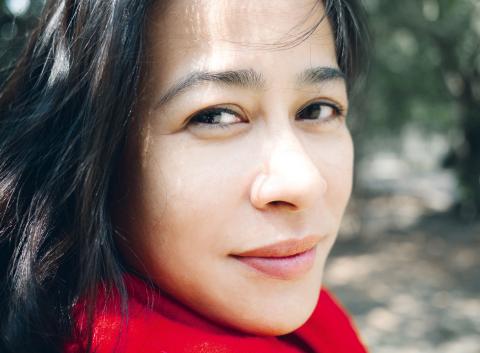For Aboriginal singer/songwriter Ilid Kaolo (以莉‧高露), bossa nova is not merely a music genre — it’s a lifestyle.
Kaolo, who released her debut album My Carefree Life (輕快的生活) to great acclaim last week, will perform two free concerts in Taipei over the next week: at Eslite Xinyi Music Store (信義誠品音樂館) tonight and at Eslite Dunnan Music Store (誠品敦南音樂館) on Wednesday.
Kaolo’s album contains 10 songs she has written over the past decade, six in Amis and four in Mandarin, that blend folk with jazz and bossa nova.

Photo Courtesy of Wind Music
“There are no big theories with my music,” Kaolo told the Taipei Times in a phone interview last week. “I hope it will calm your heart and help you reflect on what you want from life.”
The title track, My Carefree Life, is a laid-back pop gem celebrating a pastoral lifestyle.
“This song is about my memory of the agricultural life in Hualien,” the Amis songstress said. “Watching the breeze blowing at the rice harvest was a wonderful experience.”
In the second single, Charming Eyes (迷人的眼睛), Kaolo uses her sultry, jazzy vocals to encourage modern women to be brave and hold up their heads when facing romantic disillusionment in the urban jungle.
Born in Hualien, Kaolo moved to Taipei at 7 years old and made the city her home for three decades. She started performing with Formosa Aboriginal Song and Dance Troupe (原舞者) in her early 20s and moved on to join the Aboriginal niche label Wild Fire Music (野火樂集) in recent years under the nickname of Hsiao-mei (小美).
In 2006, she joined Hohak Band’s (好客樂隊) agricultural project in Taitung, farming organic rice by day and writing music by night. She returned to her hometown of Hualien last year to continue farming and work on her debut album.
“My life in Taipei was hectic,” Kaolo said. “I went to gigs to perform and had fun with friends and never thought about releasing an album. The farming life allows me to calm my mind and reflect on life. These songs are letters to friends that I wanted to pass on, but never sent.”
As an Aboriginal performer who has experienced the glamorous night life of Taipei and then reclaimed her connection to the earth through farming, Kaolo wants audiences to find peace of mind in her music.
“You can listen to these songs when you want to chill,” she said. “I would be honored if you feel these songs can relax you and ease your loneliness.”

Taiwan has next to no political engagement in Myanmar, either with the ruling military junta nor the dozens of armed groups who’ve in the last five years taken over around two-thirds of the nation’s territory in a sprawling, patchwork civil war. But early last month, the leader of one relatively minor Burmese revolutionary faction, General Nerdah Bomya, who is also an alleged war criminal, made a low key visit to Taipei, where he met with a member of President William Lai’s (賴清德) staff, a retired Taiwanese military official and several academics. “I feel like Taiwan is a good example of

March 2 to March 8 Gunfire rang out along the shore of the frontline island of Lieyu (烈嶼) on a foggy afternoon on March 7, 1987. By the time it was over, about 20 unarmed Vietnamese refugees — men, women, elderly and children — were dead. They were hastily buried, followed by decades of silence. Months later, opposition politicians and journalists tried to uncover what had happened, but conflicting accounts only deepened the confusion. One version suggested that government troops had mistakenly killed their own operatives attempting to return home from Vietnam. The military maintained that the

Before the last section of the round-the-island railway was electrified, one old blue train still chugged back and forth between Pingtung County’s Fangliao (枋寮) and Taitung (台東) stations once a day. It was so slow, was so hot (it had no air conditioning) and covered such a short distance, that the low fare still failed to attract many riders. This relic of the past was finally retired when the South Link Line was fully electrified on Dec. 23, 2020. A wave of nostalgia surrounded the termination of the Ordinary Train service, as these train carriages had been in use for decades

Lori Sepich smoked for years and sometimes skipped taking her blood pressure medicine. But she never thought she’d have a heart attack. The possibility “just wasn’t registering with me,” said the 64-year-old from Memphis, Tennessee, who suffered two of them 13 years apart. She’s far from alone. More than 60 million women in the US live with cardiovascular disease, which includes heart disease as well as stroke, heart failure and atrial fibrillation. And despite the myth that heart attacks mostly strike men, women are vulnerable too. Overall in the US, 1 in 5 women dies of cardiovascular disease each year, 37,000 of them